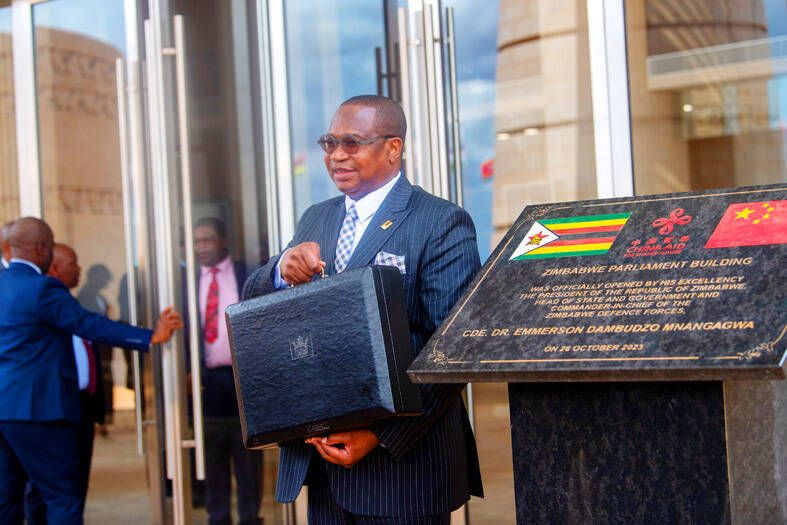Zimbabwe has started to make compensation payments to white former farm owners, 25 years after then-Zimbabwean president Robert Mugabe’s government began confiscating land.
The government paid US$3.1 million to a “first batch” of 378 farms, the Zimbabwean Ministry of Finance and Investment Promotion said in a statement on Wednesday, the first payout under a 2020 agreement to pay US$3.5 billion in compensation.
The remainder of the US$311 million due to this group of farmers would be paid in US dollar-denominated treasury bonds with two to 10-year maturities and interest of 2 percent.

Photo: EPA-EFE
That is much lower than the current yield on a two-year US treasury bond of about 3.8 percent.
Zimbabwean Ministry of Finance and Investment Promotion Mthuli Ncube said: “The payments will continue. We are very serious about this.”
Mugabe’s government seized more than 4,000 mostly white-owned farms, often violently, from about the year 2000 to redistribute to black people in what it claimed was restitution for the dispossession of British colonial rule.
However, Mugabe and his cronies took nearly 40 percent of the 14 million hectares confiscated for themselves, a 2010 investigation by local news outlet ZimOnline showed.
Agricultural production, which had accounted for 40 percent of exports, plunged and the economy collapsed, with hyperinflation reaching 89.7 sextillion percent in 2008, the second-highest hyperinflation in history, according to the Cato Institute.
Zimbabwe cannot borrow from the World Bank and the IMF as it has been in arrears since 2000 and 2001, respectively. Government debt was US$21 billion late last year, about half of which was arrears and penalties.
The compensation payments to the displaced farmers are one of the requirements of international lenders to start a debt restructuring process with Zimbabwe, including a new IMF program.
Andrew Pascoe, who signed the 2020 compensation deal while head of the Commercial Farmers’ Union, confirmed the first payments had been received on March 24 and thanked Zimbabwe’s government, in comments included in the Zimbabwean finance ministry’s statement. He said: “We are extremely grateful.”
However, Tony Hawkins, a retired University of Zimbabwe professor of economics, said the payments are a “publicity stunt,” adding that the US could block an IMF program.
A US law “restricts US support for multilateral financing to Zimbabwe until Zimbabwe makes concrete governance and economic reforms,” the US Department of State said.
Regarding using government bonds to pay farmers, Hawkins said: “We continue to accumulate arrears because we are unable to service our foreign debt, so we can’t really afford to take on new debt commitments.”
“It’s derisory, the more you look at it,” he added.
About 1,000 former farmers had signed up for compensation, said Harry Orphanides, one of Pascoe’s co-negotiators.
“Look, it’s not a perfect deal, but there was no other alternative,” he said.

‘EYE FOR AN EYE’: Two of the men were shot by a male relative of the victims, whose families turned down the opportunity to offer them amnesty, the Supreme Court said Four men were yesterday publicly executed in Afghanistan, the Supreme Court said, the highest number of executions to be carried out in one day since the Taliban’s return to power. The executions in three separate provinces brought to 10 the number of men publicly put to death since 2021, according to an Agence France-Presse tally. Public executions were common during the Taliban’s first rule from 1996 to 2001, with most of them carried out publicly in sports stadiums. Two men were shot around six or seven times by a male relative of the victims in front of spectators in Qala-i-Naw, the center

Australia’s opposition party yesterday withdrew election promises to prevent public servants from working from home and to slash more than one in five federal public-sector jobs. Opposition leader Peter Dutton announced his conservative Liberal Party had dropped its pledge that public servants would be required to work in their offices five days a week except in exceptional circumstances. “I think we made a mistake in relation to this policy,” Dutton told Nine Network television. “I think it’s important that we say that and recognize it, and our intention was to make sure that where taxpayers are working hard and their money is

Canadian Prime Minister Mark Carney is leaning into his banking background as his country fights a trade war with the US, but his financial ties have also made him a target for conspiracy theories. Incorporating tropes familiar to followers of the far-right QAnon movement, conspiratorial social media posts about the Liberal leader have surged ahead of the country’s April 28 election. Posts range from false claims he recited a “satanic chant” at a campaign event to artificial intelligence (AI)-generated images of him in a pool with convicted sex offender Jeffrey Epstein. “He’s the ideal person to be targeted here, for sure, due to

DISPUTE: Beijing seeks global support against Trump’s tariffs, but many governments remain hesitant to align, including India, ASEAN countries and Australia China is reaching out to other nations as the US layers on more tariffs, in what appears to be an attempt by Beijing to form a united front to compel Washington to retreat. Days into the effort, it is meeting only partial success from countries unwilling to ally with the main target of US President Donald Trump’s trade war. Facing the cratering of global markets, Trump on Wednesday backed off his tariffs on most nations for 90 days, saying countries were lining up to negotiate more favorable conditions. China has refused to seek talks, saying the US was insincere and that it